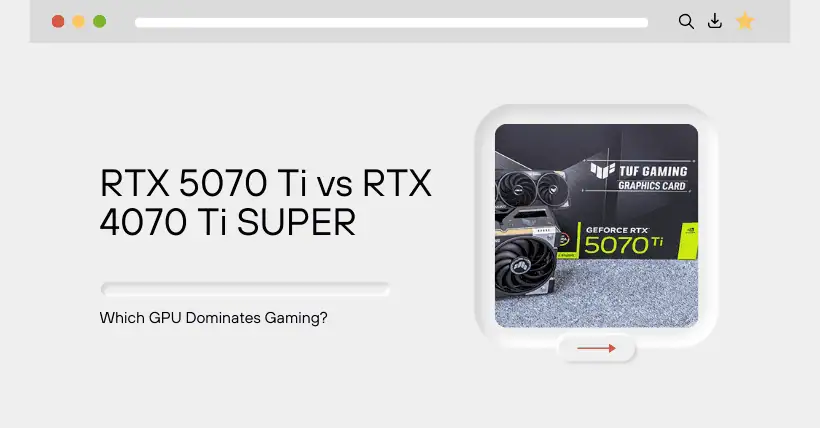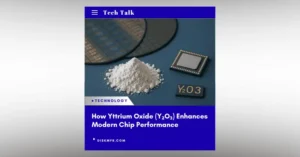I. Introduction
Currently, the GeForce RTX 5070 Ti has been released, but it comes with a high premium. To be fair, now might not be the best time to purchase it. In this situation, as an alternative, the GeForce RTX 4070 Ti SUPER is a viable option to consider.
This article will compare the gaming performance of the GeForce RTX 5070 Ti and GeForce RTX 4070 Ti SUPER to assess whether the GeForce RTX 4070 Ti SUPER can serve as a substitute for the GeForce RTX 5070 Ti. Of course, if the performance difference is not significant, it can be considered a replacement.
II. Specifications Comparison
The GeForce RTX 5070 Ti was released on January 6, 2025, featuring the GB203 GPU chip, TSMC’s 5nm process, with 8,960 CUDA cores, 280 texture units, 70 multi-process stream processors, 280 tensor cores, and 70 ray tracing cores.
It has a 64MB L2 cache, a base clock speed of 2,300 MHz, a boost clock speed of 2,452 MHz, 16GB of GDDR7 memory, a memory bus width of 256 bits, a memory speed of 28 Gbps, a memory bandwidth of 896 GB/s, an FP32 floating point performance of 43.94 TFLOPS, a power consumption of 300W, and a reference price of $749.
The GeForce RTX 4070 Ti SUPER was released on January 8, 2024, featuring the AD103-275 GPU, based on the Ada Lovelace architecture and built on TSMC’s 5nm process, with 8,448 CUDA cores, 264 texture units, 96 raster units, 66 ray tracing cores, 66 multi-process stream processors, and 264 tensor cores. It has a 64MB L2 cache.
The base clock speed is 2,340 MHz, the boost clock speed is 2,610 MHz, with 16GB of GDDR6X memory, a memory bus width of 256 bits, a memory speed of 22.4 Gbps, a memory bandwidth of 716.8 GB/s, an FP32 floating point performance of 44.10 TFLOPS, a power consumption of 285W, and a suggested retail price of $799.
III. Test Platform Configuration
The primary configuration is as follows:
- Processor: Ryzen 7 9800X3D
- Motherboard: MSI MPG X670E CARBON
- Memory: 32GB DDR5 6000MHz
- Graphics Cards: GeForce RTX 5080 16GB and GeForce RTX 4090 24GB
- Storage: Two Samsung 970 EVO 1TB SSDs
- Operating System: Windows 11
IV. Game Testing
The following tests were conducted with seven games, all using 4K graphics settings. In the images below, the platform on the left represents the GeForce RTX 4070 Ti SUPER, and the platform on the right represents the GeForce RTX 5070 Ti.
The first game is God of War.
- GeForce RTX 4070 Ti SUPER platform: Average frame rate of 81 FPS, minimum instantaneous frame rate of 70 FPS, frame time of 12.6ms, CPU usage of 30%, power consumption of 51W, temperature of 54°C, memory usage of 11.8GB, GPU usage of 99%, VRAM usage of 8.1GB, power consumption of 287W, temperature of 55°C.
- GeForce RTX 5070 Ti platform: Average frame rate of 96 FPS, minimum instantaneous frame rate of 85 FPS, frame time of 10.6ms, CPU usage of 14%, power consumption of 47W, temperature of 50°C, memory usage of 12.3GB, GPU usage of 99%, VRAM usage of 8.5GB, power consumption of 279W, temperature of 53°C.
In this game, the GeForce RTX 5070 Ti platform’s CPU usage is 16% lower than the competitor, almost half, with memory usage 0.5GB higher, GPU usage the same, and VRAM usage 0.4GB higher.
In terms of average frame rate, the GeForce RTX 5070 Ti platform outperforms the GeForce RTX 4070 Ti SUPER by 15 FPS, with the minimum instantaneous frame rate also 15 FPS higher, frame time around 2ms lower, power consumption 8W lower, and temperature 2°C lower.
The second game is Ghostwire: Tokyo.
- GeForce RTX 4070 Ti SUPER platform: Average frame rate of 54 FPS, minimum instantaneous frame rate of 50 FPS, frame time of 17.6ms, CPU usage of 11%, power consumption of 43W, temperature of 51°C, memory usage of 11.6GB, GPU usage of 99%, VRAM usage of 8.3GB, power consumption of 276W, temperature of 54°C.
- GeForce RTX 5070 Ti platform: Average frame rate of 60 FPS, minimum instantaneous frame rate of 53 FPS, frame time of 16.8ms, CPU usage of 10%, power consumption of 43W, temperature of 50°C, memory usage of 10.7GB, GPU usage of 99%, VRAM usage of 8.3GB, power consumption of 278W, temperature of 53°C.
In this game, the CPU usage of the GeForce RTX 5070 Ti platform is 1% lower than the competitor, almost the same, with memory usage 0.9GB lower and equal GPU usage and VRAM usage.
In terms of average frame rate, the GeForce RTX 5070 Ti platform outperforms the GeForce RTX 4070 Ti SUPER by 6 FPS, with the minimum instantaneous frame rate 3 FPS higher, frame time around 1ms lower, power consumption 2W higher, and temperature 1°C lower, both being nearly the same.
The third game is Horizon Forbidden West.
- GeForce RTX 4070 Ti SUPER platform: Average frame rate of 66 FPS, minimum instantaneous frame rate of 55 FPS, frame time of 15.0ms, CPU usage of 36%, power consumption of 84W, temperature of 69°C, memory usage of 12.0GB, GPU usage of 99%, VRAM usage of 9.8GB, power consumption of 268W, temperature of 51°C.
- GeForce RTX 5070 Ti platform: Average frame rate of 71 FPS, minimum instantaneous frame rate of 61 FPS, frame time of 13.4ms, CPU usage of 39%, power consumption of 93W, temperature of 70°C, memory usage of 11.9GB, GPU usage of 98%, VRAM usage of 10.4GB, power consumption of 252W, temperature of 50°C.
In this game, the GeForce RTX 5070 Ti platform’s CPU usage is 3% higher than the competitor, with memory usage and GPU usage being nearly the same, and VRAM usage 0.6GB higher.
In terms of average frame rate, the GeForce RTX 5070 Ti platform outperforms the GeForce RTX 4070 Ti SUPER by 5 FPS, with the minimum instantaneous frame rate 6 FPS higher, frame time around 2ms lower, power consumption 16W lower, and temperature 1°C lower, nearly the same.
The fourth game is Silent Hill 2.
- GeForce RTX 4070 Ti SUPER platform: Average frame rate of 59 FPS, minimum instantaneous frame rate of 50 FPS, frame time of 16.6ms, CPU usage of 13%, power consumption of 49W, temperature of 43°C, memory usage of 11.5GB, GPU usage of 98%, VRAM usage of 8.3GB, power consumption of 261W, temperature of 53°C.
- GeForce RTX 5070 Ti platform: Average frame rate of 67 FPS, minimum instantaneous frame rate of 50 FPS, frame time of 14.6ms, CPU usage of 14%, power consumption of 50W, temperature of 50°C, memory usage of 11.1GB, GPU usage of 98%, VRAM usage of 8.6GB, power consumption of 241W, temperature of 51°C.
In this game, the GeForce RTX 5070 Ti platform’s CPU usage is 1% higher than the competitor, nearly the same, with memory usage 0.4GB lower, GPU usage nearly identical, and VRAM usage 0.3GB higher.
In terms of average frame rate, the GeForce RTX 5070 Ti platform outperforms the GeForce RTX 4070 Ti SUPER by 8 FPS, with the minimum instantaneous frame rate being the same, frame time around 2ms lower, power consumption 20W lower, and temperature 2°C lower.
The fifth game is Forza Horizon 5.
- GeForce RTX 4070 Ti SUPER platform: Average frame rate of 114 FPS, minimum instantaneous frame rate of 96 FPS, frame time of 7.6ms, CPU usage of 21%, power consumption of 66W, temperature of 60°C, memory usage of 12.3GB, GPU usage of 94%, VRAM usage of 10.1GB, power consumption of 215W, temperature of 51°C.
- GeForce RTX 5070 Ti platform: Average frame rate of 122 FPS, minimum instantaneous frame rate of 104 FPS, frame time of 8.4ms, CPU usage of 22%, power consumption of 63W, temperature of 53°C, memory usage of 12.3GB, GPU usage of 98%, VRAM usage of 9.9GB, power consumption of 217W, temperature of 49°C.
In this game, the CPU usage and memory usage are nearly identical between the two platforms, with the GeForce RTX 5070 Ti platform having 4% higher GPU usage and 0.2GB lower VRAM usage.
In terms of average frame rate, the GeForce RTX 5070 Ti platform outperforms the GeForce RTX 4070 Ti SUPER by 8 FPS, with the minimum instantaneous frame rate 8 FPS higher, frame time being nearly identical, power consumption 2W higher, and temperature 2°C lower.
The sixth game is Black Myth: Wukong.
- GeForce RTX 4070 Ti SUPER platform: Average frame rate of 38 FPS, minimum instantaneous frame rate of 34 FPS, frame time of 26.3ms, CPU usage of 11%, power consumption of 41W, temperature of 49°C, memory usage of 12.2GB, GPU usage of 99%, VRAM usage of 10.4GB, power consumption of 262W, temperature of 55°C.
- GeForce RTX 5070 Ti platform: Average frame rate of 45 FPS, minimum instantaneous frame rate of 33 FPS, frame time of 22.2ms, CPU usage of 12%, power consumption of 46W, temperature of 54°C, memory usage of 12.5GB, GPU usage of 99%, VRAM usage of 10.6GB, power consumption of 267W, temperature of 53°C.
In this game, the GeForce RTX 5070 Ti platform’s CPU usage is 1% higher than the competitor, nearly the same, with memory usage 0.3GB higher, equal GPU usage, and VRAM usage 0.2GB higher.
In terms of average frame rate, the GeForce RTX 5070 Ti platform outperforms the GeForce RTX 4070 Ti SUPER by 7 FPS, with the minimum instantaneous frame rate being nearly the same, frame time around 4ms lower, power consumption 5W higher, and temperature 2°C lower.
The seventh game is S.T.A.L.K.E.R. 2.
- GeForce RTX 4070 Ti SUPER platform: Average frame rate of 41 FPS, minimum instantaneous frame rate of 35 FPS, frame time of 23.3ms, CPU usage of 20%, power consumption of 56W, temperature of 47°C, memory usage of 15.9GB, GPU usage of 99%, VRAM usage of 9.2GB, power consumption of 279W, temperature of 55°C.
- GeForce RTX 5070 Ti platform: Average frame rate of 48 FPS, minimum instantaneous frame rate of 42 FPS, frame time of 21.5ms, CPU usage of 20%, power consumption of 64W, temperature of 58°C, memory usage of 15.8GB, GPU usage of 98%, VRAM usage of 9.5GB, power consumption of 260W, temperature of 53°C.
In this game, the CPU usage, memory usage, and GPU usage are nearly identical between the two platforms, with the GeForce RTX 5070 Ti platform having 0.3GB more VRAM.
In terms of average frame rate, the GeForce RTX 5070 Ti platform outperforms the GeForce RTX 4070 Ti SUPER by 7 FPS, with the minimum instantaneous frame rate 7 FPS higher, frame time around 2ms lower, power consumption 19W lower, and temperature 2°C lower.
V. Comparison Conclusion
The comparison results are clear: The performance gap between the GeForce RTX 4070 Ti SUPER and GeForce RTX 5070 Ti is minimal. The GeForce RTX 5070 Ti is essentially a slightly improved version of the GeForce RTX 4070 Ti SUPER, offering slightly higher performance, with power consumption and temperature control performance being similar.
The final conclusion is: If you’re not focused on getting the latest model and prioritize cost-effectiveness, the GeForce RTX 4070 Ti SUPER is a viable alternative to the GeForce RTX 5070 Ti at this stage.
Related:

Disclaimer:
- This channel does not make any representations or warranties regarding the availability, accuracy, timeliness, effectiveness, or completeness of any information posted. It hereby disclaims any liability or consequences arising from the use of the information.
- This channel is non-commercial and non-profit. The re-posted content does not signify endorsement of its views or responsibility for its authenticity. It does not intend to constitute any other guidance. This channel is not liable for any inaccuracies or errors in the re-posted or published information, directly or indirectly.
- Some data, materials, text, images, etc., used in this channel are sourced from the internet, and all reposts are duly credited to their sources. If you discover any work that infringes on your intellectual property rights or personal legal interests, please contact us, and we will promptly modify or remove it.








